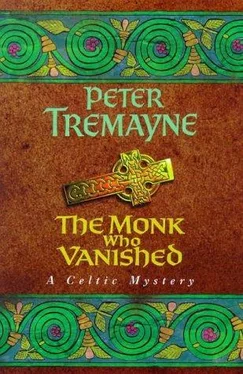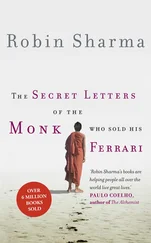Peter Tremayne - The Monk Who Vanished
Здесь есть возможность читать онлайн «Peter Tremayne - The Monk Who Vanished» весь текст электронной книги совершенно бесплатно (целиком полную версию без сокращений). В некоторых случаях можно слушать аудио, скачать через торрент в формате fb2 и присутствует краткое содержание. Жанр: Исторический детектив, на английском языке. Описание произведения, (предисловие) а так же отзывы посетителей доступны на портале библиотеки ЛибКат.
- Название:The Monk Who Vanished
- Автор:
- Жанр:
- Год:неизвестен
- ISBN:нет данных
- Рейтинг книги:3 / 5. Голосов: 1
-
Избранное:Добавить в избранное
- Отзывы:
-
Ваша оценка:
- 60
- 1
- 2
- 3
- 4
- 5
The Monk Who Vanished: краткое содержание, описание и аннотация
Предлагаем к чтению аннотацию, описание, краткое содержание или предисловие (зависит от того, что написал сам автор книги «The Monk Who Vanished»). Если вы не нашли необходимую информацию о книге — напишите в комментариях, мы постараемся отыскать её.
The Monk Who Vanished — читать онлайн бесплатно полную книгу (весь текст) целиком
Ниже представлен текст книги, разбитый по страницам. Система сохранения места последней прочитанной страницы, позволяет с удобством читать онлайн бесплатно книгу «The Monk Who Vanished», без необходимости каждый раз заново искать на чём Вы остановились. Поставьте закладку, и сможете в любой момент перейти на страницу, на которой закончили чтение.
Интервал:
Закладка:
The sound of something being dropped caused them both to start and glance at each other. The sound had come from Brother Mochta’s chamber.
Fidelma placed a finger against her lips and slowly reached for the handle, her hand closing tightly on it. Then, with a quick jerk, she opened it and flung open the door. As she had guessed, it was not locked.
Finguine, Prince of Cnoc Aine, stared up at them with surprise from a kneeling position on the floor.
After a moment or two of silence, he climbed to his feet and brushed the dust from his knees.
‘Fidelma, you gave me a start,’ he rebuked.
‘No more of a start than you gave us,’ Eadulf replied.
‘What are you doing here, cousin?’ asked Fidelma, looking quickly about the room.
Finguine grimaced awkwardly. ‘I heard from the steward of the abbey …’
‘Brother Madagan?’ interposed Eadulf.
‘The same. He told me about the disappearance and I asked to see the room. It looks as if there has been a struggle here and the poor Brother was taken off by force. Perhaps he was made to get the Relics from the chapel and then was carried off into the hills. He was probably killed there.’
Fidelma regarded her cousin seriously for a moment. ‘Is that your interpretation of events, Finguine?’
‘I don’t think that you need to have a keen imagination to interpret this,’ Finguine said, waving his hand around the room.
‘But …’ began Eadulf and suddenly saw the icy fire in Fidelma’s eyes. He snapped his mouth shut almost painfully.
Finguine turned to him questioningly.
‘What was that?’
Eadulf grimaced awkwardly. ‘I just meant that appearances can sometimes be misleading. I … er … well, what you say does seem to be a logical interpretation.’
Finguine turned back to Fidelma. ‘There, you see? I am afraid that we might be looking for a body rather than Brother Mochta alive. Once the thieves had the Holy Relics in their grasp what need would they have of Brother Mochta?’
‘Then why take him in the first place?’ Fidelma could not help the response.
‘Perhaps to prevent him raising the alarm?’
‘They could have left him trussed up in his chamber,’ suggested Eadulf.
‘True. But he might have been found earlier than they would wish and so they decided to take him with them. Then the community would spend time searching and allow the thieves time to ride away.’
‘I think, my cousin, the Prince of Cnoc Aine, has a good point, Eadulf.’
Eadulf stared at Fidelma in bewilderment. She was trying to convey something to him by the slight inflection in her tone. She was obviously warning him not to be free with his opposition to the points being made by Finguine.
‘Anyway, cousin,’ she went on easily, ‘your theory can only be proved one way or the other, if we find Brother Mochta’s remains in the hills.’
Finguine drew himself up and his smile was one of painful satisfaction.
‘I am afraid that I can now prove that.’
Eadulf jaw dropped. ‘Do you mean that you have found the remains of Brother Mochta?’
‘I do.’
They greeted the news with some moments of silence.
‘Where were the remains found?’ Fidelma asked.
‘Come, I will show you,’ Finguine replied briskly. ‘One of my men found the grisly thing in the fields not far from here. It was being ravaged by wolves. He brought it here in a sack so that it could be identified. We took it to the apothecary.’
‘To Brother Bardan?’
‘If he is the apothecary, yes, to him.’
‘Has he identified the remains?’
‘Not yet. While I was waiting, I came to Mochta’s chamber to see if the scene fitted with my conception of the event.’
They followed the Prince of Cnoc Aine to the apothecary. Inside one of Finguine’s warriors perched moodily on the edge of a table. Brother Bardan himself was bending over something that had been previously wrapped in sacking. It was laid on the table.
Brother Bardan glanced at them as they entered with a bleak expression.
‘I am afraid there is no doubt,’ he said as if in answer to their unasked question.
‘Is it the missing monk?’ Finguine wanted the matter clarified.
Brother Bardan nodded morosely. ‘This is the forearm of Brother Mochta. It had been severed by wolves. Look at the mark of canine teeth on it.’
Fidelma set her jaw firmly and moved to his side. She looked down. It was a forearm, torn and blooded. It had been severed at the elbow. The hand was still attached to it. It was a left forearm.
‘Well, that solves the mystery of where the poor Brother has vanished too,’ Finguine announced. ‘I think it also proves my point about the theft.’
Fidelma said nothing. She was still staring at the severed forearm. The she turned, wrinkling her nose in distaste.
‘Are you sure that you can positively identify this as the remains of Brother Mochta?’ she asked.
‘There is no doubt of it, as I have said.’ The apothecary nodded affirmatively.
‘Thank you, Brother.’
‘I will send some men to scour the hills where it was found,’ Finguine assured the apothecary. ‘We might pick up the trail of the thieves but I doubt it.’
‘Let me know if anything else is discovered,’ she requested her cousin as she signalled to Eadulf to follow her.
‘Well,’ Eadulf said slowly, once they were on their own, ‘that appears to be that. Now we know what happened to Brother Mochta.’
‘No we don’t,’ snapped Fidelma irritably. ‘What has just been confirmed is that Brother Bardán is a liar.’
Chapter Sixteen
‘Brother Bardan, a liar?’ Eadulf’s eyebrows shot up expressively.
‘How do you deduce that?’
‘Brother Bardan identified that arm, positively and without question, as that of Brother Mochta, didn’t he?’
‘Yes. Are you saying that he lied? That it was not Mochta and the apothecary knew it?’
Fidelma stamped her foot in annoyance. ‘Surely you were not misled?’
Eadulf shook his head, frowning. ‘How can we be sure it was not Brother Mochta’s arm?’
‘Which arm was it?’
‘The left arm. The left forearm … oh!’
Eadulf stopped as the realisation struck him. According to the description of Abbot Ségdae, Mochta’s left forearm had carried the tattoo mark — the bird — exactly as it was on the forearm of the body at Cashel. Brother Bardán must have known that the tattoo would have been on that arm.
‘So he deliberately lied,’ affirmed Fidelma.
‘But why? And whose arm was it?’ asked Eadulf.
‘Doubtless it was the arm of the poor driver of Samradán … after the wolves had done with him. But why the lie? Is it to stop us pursuing the missing Brother Mochta further? Can Mochta be the same person as the Cashel assassin? More questions. But, at last, I believe that we are getting somewhere. Come on.’
She hurried off down the corridor and came to a halt back where they had started from, at Brother Mochta’s cell door. This time, however, she did not go to that room but, glancing round to ensure they were unobserved, she tried the next door — the door of Brother Bardán’s room. It was open, of course, and she pulled Eadulf into the room after her.
‘What are we looking for?’ whispered the astonished Saxon.
‘I am not sure. Just stand by the door and let me know if anyone comes.’
The room was sparsely fitted. A bed, table and a chair; hooks forhanging clothing. There were two spare habits, a woollen cloak for winter, a leather hat to keep off the rain, two extra pairs of sandals, one studded with nails and stained green — shoes that the apothecary doubtless used on his field trips to gather wild herbs. There were two books on the table. Both were on herbal cures. In fact, when she looked closely, she found that the second one was in the process of being written. Most of its pages were untouched and pristine. The early pages were written in an interesting style.
Читать дальшеИнтервал:
Закладка:
Похожие книги на «The Monk Who Vanished»
Представляем Вашему вниманию похожие книги на «The Monk Who Vanished» списком для выбора. Мы отобрали схожую по названию и смыслу литературу в надежде предоставить читателям больше вариантов отыскать новые, интересные, ещё непрочитанные произведения.
Обсуждение, отзывы о книге «The Monk Who Vanished» и просто собственные мнения читателей. Оставьте ваши комментарии, напишите, что Вы думаете о произведении, его смысле или главных героях. Укажите что конкретно понравилось, а что нет, и почему Вы так считаете.












